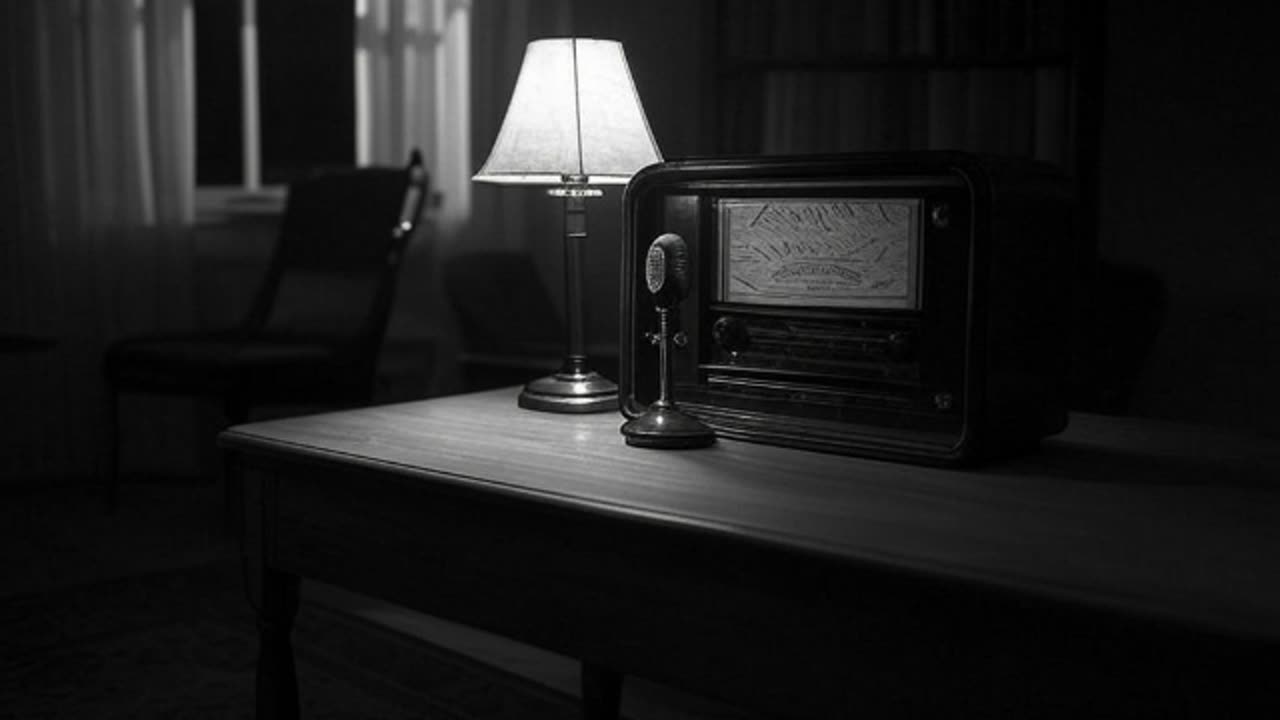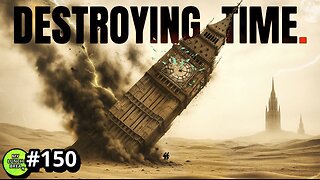Premium Only Content

Lights Out: Revolt of the Worms (October 13, 1942)
Setting: A contemporary (1942) rural American setting, likely a remote laboratory or greenhouse, with scenes in a garden and surrounding fields. The episode uses sound effects like squishing flesh, grinding earth, wood cracking, and frantic footsteps to create a visceral, nightmarish atmosphere, emphasizing the grotesque growth of monstrous worms.
Plot:
Introduction: The episode opens with the Lights Out theme, a dissonant orchestral score, followed by Arch Oboler’s ominous voice commanding, “Lights out, everybody!” accompanied by a crashing sound effect. The narrator introduces “Revolt of the Worms,” a tale of scientific hubris and monstrous consequences, setting a tense wartime tone.
The Premise: The story centers on Charles Prentice, a chemist and horticulturist who has fled war service to obsessively develop the world’s largest roses using a special human hormone solution. His wife, Claire, and young assistant, Jackson, support his experiments in a secluded laboratory. Charles’s arrogance and disdain for the war—reflected in his shrill treatment of Claire and exploitation of Jackson—set the stage for disaster. When Jackson discards excess hormone solution into the ground, it seeps into the soil, affecting nearby earthworms.
Escalating Horror: The worms, mutated by the hormones, grow to enormous sizes—ten, twenty, or even thirty feet long—becoming blind, writhing monstrosities. Charles’s stream-of-consciousness narration, delivered in a frenetic, repetitive style, conveys his growing terror as he realizes the worms are multiplying and emerging from the earth. Key scenes include Claire’s horrific death, crushed by a giant worm, and Jackson’s presumed demise, both underscored by squishing sounds and screams. The worms’ relentless squirming and scraping, described as a “sea of flesh,” dominate the soundscape, with effects like wood cracking as they burrow under and lift the house. Charles’s guilt and fear intensify, blaming himself for running from the war and unleashing this horror.
Climax and Resolution: The climax occurs as Charles, alone and trapped, awaits his fate in the collapsing laboratory. The worms invade, filling the room with their cold, wet flesh, as he narrates his suffocation in increasingly incoherent terror. Sound effects of grinding earth and snapping wood peak, culminating in Charles’s death as the worms crush him. The episode ends abruptly, with Oboler’s closing remarks emphasizing the folly of defying nature and war’s moral demands, leaving listeners rattled. The 21-minute runtime, noted as short, intensifies the relentless pace.
Themes: The dangers of scientific hubris, the consequences of evading duty, and nature’s revolt against human arrogance. Oboler’s anti-Nazi stance and wartime context infuse the story with a critique of those who shirk responsibility, making the worms a metaphor for unchecked chaos.
Cast and Roles:
Charles Prentice: Played by an unnamed actor, likely a Chicago radio veteran, voicing the arrogant, obsessive scientist with a shrill, frantic tone, shifting from hubris to incoherent terror as the worms overwhelm him.
Claire (Charles’s Wife): Played by an unnamed actress, portraying a supportive but mistreated spouse, voiced with quiet resignation until her horrifying death scream.
Jackson (Assistant): Played by an unnamed actor, voicing a young, overworked aide with earnestness and fear, fading after his presumed offstage death.
The Worms: Unvoiced, their presence conveyed through sound effects like squishing flesh, scraping bristles, and grinding earth, designed to evoke visceral horror.
Announcer/Narrator: Arch Oboler, delivering the opening and closing remarks with his signature ominous tone, framing the story’s terror and moral lesson.
Note on Cast: Lights Out relied on Chicago’s skilled radio actors, with no specific credits for this episode. Performances were intense, matching Oboler’s visceral style, with Charles’s repetitive monologues driving the psychological horror.
Production Details:
Music: A dissonant orchestral score, likely composed by NBC’s in-house musicians, opens and closes the episode, with minimal stings to maintain focus on sound effects, enhancing the grotesque atmosphere.
Writer/Director: Arch Oboler, crafting a horror tale with his signature blend of social commentary and gruesome imagery, drawing on wartime anxieties and pulp monster tropes.
Sound Effects: Central to the episode, including squishing flesh, scraping bristles (noted as earthworm anatomy in ghoulishdelights.com), grinding earth, wood cracking, and screams, creating a vivid, skin-crawling soundscape. The worms’ movement was meticulously designed to evoke disgust.
Sponsor: Unsponsored during its 1942 NBC revival, Lights Out aired Tuesday nights, supported by the network’s commitment to horror programming, allowing Oboler’s bold vision.
Source Note: Details are confirmed via archive.org, oldtimeradiodownloads.com, and tangentonline.com, with a preserved recording available. The episode’s runtime is approximately 21 minutes, per Amazon’s track listing.
World and National Events Around October 13, 1942:
To provide context for the broadcast, here are key world and national events occurring in mid-October 1942, reflecting the wartime climate that shaped listeners’ perspectives:
World Events:
World War II – Pacific Theater: The Battle of Cape Esperance (October 11–12, 1942) saw a U.S. naval victory near Guadalcanal, bolstering morale after heavy losses. The Guadalcanal Campaign (August 1942–February 1943) dominated radio news, with updates on fierce fighting, resonating with Oboler’s critique of war shirkers.
European Theater: The Second Battle of El Alamein (October 23–November 11, 1942) was imminent, with Allied forces preparing to counter Axis advances in North Africa. Radio broadcasts highlighted the global stakes, echoing the episode’s theme of confronting monstrous threats.
Holocaust Escalation: Nazi deportations to death camps like Treblinka and Auschwitz intensified, with limited U.S. awareness via radio and newspapers. Oboler’s anti-Nazi stance, noted in tangentonline.com, infused the episode with wartime moral urgency.
Japanese Advances: Japan’s control over the Philippines and Burma persisted, with radio reports on Allied efforts to disrupt supply lines, amplifying fears of Axis dominance.
National Events:
War Mobilization: The U.S. war effort was in full swing, with rationing of gas, sugar, and rubber enforced. War bond drives, promoted on radio, urged civilian support, while factories produced war materials, reflecting the duty Charles evades in the episode.
Japanese American Incarceration: Over 100,000 Japanese Americans were interned in camps like Manzanar under Executive Order 9066 (February 1942). Radio debates on the policy heightened wartime tensions, paralleling the episode’s theme of moral consequences.
Entertainment and Morale: Hollywood and radio boosted morale, with films like Casablanca (premiered November 1942) and radio shows like The Bob Hope Show mixing humor with patriotism. Lights Out’s horror offered a stark contrast, channeling wartime fears into supernatural dread.
Sports and Culture: The 1942 World Series (September 30–October 5) saw the St. Louis Cardinals defeat the New York Yankees, lifting spirits. Bing Crosby’s “White Christmas” (released 1942) became a wartime anthem, covered on radio.
-
 19:58
19:58
TampaAerialMedia
16 hours ago $0.32 earnedKEY LARGO - Florida Keys Part 1 - Snorkeling, Restaurants,
17.7K12 -
 1:23
1:23
Memology 101
2 days ago $0.83 earnedFar-left ghoul wants conservatives DEAD, warns Dems to get on board or THEY ARE NEXT
17K52 -
 3:27:27
3:27:27
SavageJayGatsby
6 hours ago🔥🌶️ Spicy Saturday – BITE Edition! 🌶️🔥
48.7K4 -
 26:09
26:09
Exploring With Nug
16 hours ago $11.02 earned13 Cold Cases in New Orleans What We Discovered Beneath the Surface!
47.5K17 -
 27:39
27:39
MYLUNCHBREAK CHANNEL PAGE
11 hours agoDestroying Time.
130K34 -
 3:27:19
3:27:19
Mally_Mouse
6 hours ago🌶️ 🥵Spicy BITE Saturday!! 🥵🌶️- Let's Play: Minecraft Christmas Adventure!!
130K6 -
 2:14:31
2:14:31
Side Scrollers Podcast
11 hours agoSide Scrollers INVITE ONLY - Live From Dreamhack
157K14 -
 1:18:23
1:18:23
Simply Bitcoin
2 days ago $14.32 earnedThe Bitcoin Crucible w/ Alex Stanczyk and Lawrence Lepard
37.9K6 -
 1:25:03
1:25:03
Jeff Ahern
11 hours ago $23.77 earnedThe Saturday Show with Jeff Ahern
101K16 -
 1:31:56
1:31:56
Michael Franzese
1 day agoWill NBA do anything about their Gambling Problems?
152K32